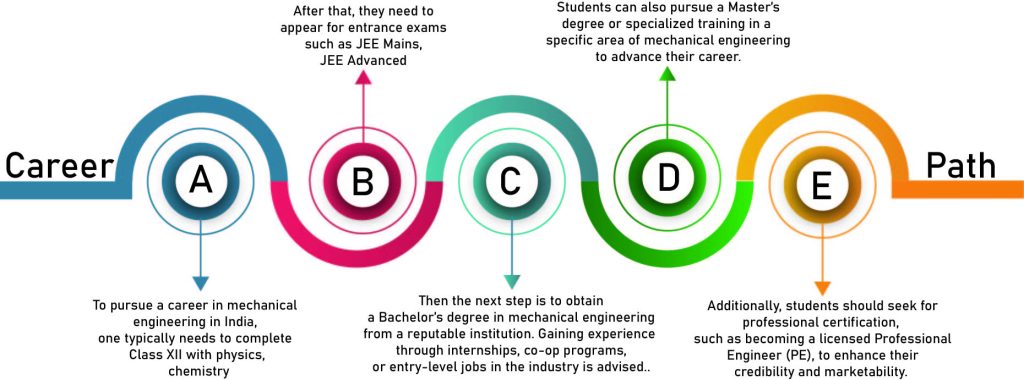Mechanical engineering is a branch of engineering that deals with the design, manufacturing, and maintenance of mechanical systems. This includes the study of materials, mechanics, thermodynamics, robotics, and other related fields to create machines and systems that are efficient, safe, and reliable. Mechanical engineers work on a wide range of products and technologies, from cars and airplanes to medical devices and power plants. They apply principles of physics and mathematics to analyze and design mechanical systems, and use computer-aided design (CAD) tools and simulations to test and optimize their designs. The field of mechanical engineering is constantly evolving, with new technologies and materials being developed all the time.

Work description
The work of a mechanical engineer involves designing, developing, and testing mechanical systems and products. They use their knowledge of physics, mathematics, and materials science to create new products or improve existing ones.
Mechanical engineers also oversee the manufacturing process, ensuring that the product is built to the required specifications and quality standards. They may work on a wide range of projects, from creating machines for manufacturing to developing new medical devices or transportation systems.
Additionally, mechanical engineers may be involved in research and development, where they design and conduct experiments to test new materials and technologies.
High Demand
High demand for mechanical engineers across a wide range of industries.
Lucrative salaries
Opportunity to work on a variety of projects and technologies.
Opportunities for innovation
High earning potential, with competitive salaries and benefits packages.
Versatility
Possibility for career advancement into management or leadership roles.
Flexibility
Opportunity to work on projects that have a real-world impact and improve people’s lives.
Job satisfaction
Constantly evolving field with new technologies and materials being developed.
High stress
Can be a challenging and demanding field that requires a lot of technical expertise and attention to detail.
Long hours
May require long hours, especially during the design and development stages of a project.
Competitive field
May require frequent travel, particularly for those working in fields such as manufacturing or energy.
Constant learning
May be subject to fluctuations in demand depending on the state of the economy or industry.
Isolation
Can be competitive, with a large pool of qualified candidates vying for top positions.
Eye strain and other physical health issues
May require ongoing education and training to keep up with new developments and technologies in the field.
The cost of becoming a mechanical engineer in India can vary widely depending on factors such as the type of institution, level of education, and location. For example, pursuing a degree from a top-tier institution may cost significantly more than attending a state university or polytechnic.
On average, a Bachelor’s degree in mechanical engineering from a reputable institution can cost anywhere from Rs. 1 lakh to 5 lakhs per year, while a Master’s degree may cost Rs. 50,000 to 3 lakhs per year.
In addition to tuition fees, there may be additional costs for textbooks, laboratory fees, and other materials. Scholarships and financial aid may be available to help offset the cost of education. Overall, it’s important to research and compare costs at different institutions before deciding on a course of study.
[wpcharts type=”horizontalbarchart” bgcolor=”red:gray:yellow,blue:gray:yellow,random:gray:yellow,purple:gray:yellow” min=”0″ legend=”true” titles=”2 year , 5 year” values=”3,7,5,12″]
The earning potential of mechanical engineers in India can vary depending on factors such as experience, education, location, and industry. According to payscale.com, the average salary for a mechanical engineer in India is around Rs. 4,00,000 per year. However, salaries can range from Rs. 2,00,000 to Rs. 10,00,000 or more depending on the above-mentioned factors.
Mechanical engineers working in industries such as automotive, aerospace, and manufacturing tend to earn higher salaries than those in other industries.
Additionally, those with advanced degrees or specialized skills may be able to command higher salaries. Overall, mechanical engineering is a field that offers competitive salaries and opportunities for career advancement.
[wpcharts type=”horizontalbarchart” bgcolor=”red:gray:yellow,blue:gray:yellow,random:gray:yellow,purple:gray:yellow” min=”0″ legend=”false” titles=”Entry-Level, Mid-Career, Senior-Level ” values=”5,15,25,35,45,55″]
Strong problem-solving and analytical skills.
Solid understanding of physics and mathematics.
Creativity and innovation to develop new solutions and products.
Attention to detail to ensure designs meet specifications and standards.
Good communication and teamwork skills to collaborate effectively with colleagues and clients.
Strong work ethic and ability to work under pressure to meet deadlines.
Poor time management skills, as mechanical engineering projects often have strict deadlines.
Lack of attention to detail, as small mistakes can have significant consequences in mechanical engineering.
Inability to work well in a team environment, as collaboration is crucial in mechanical engineering.
Poor communication skills, which can hinder effective collaboration and project management.
Resistance to change or unwillingness to adapt to new technologies and techniques.a
Inability to handle stress and pressure, which can lead to poor performance and mistakes.
Work-life balance
The work-life balance of a mechanical engineer can vary depending on the nature of their work, industry, and employer. In general, mechanical engineers may work long hours during project deadlines or product launches, but they may also have periods of downtime between projects. Many mechanical engineers work in office or laboratory settings, which may offer more predictable schedules than those in the field or on the manufacturing floor. To manage their work and personal life, mechanical engineers may prioritize and manage their time efficiently, take breaks, and communicate openly about their work load with their employer.

Advancements in technology and innovation that improve quality of life.
Development of new and sustainable energy sources that reduce environmental impact.
Design of safer and more efficient transportation systems.
Creation of job opportunities and economic growth in related industries.
Development of medical devices and equipment that improve healthcare outcomes.
Improvements in manufacturing processes that lead to increased productivity and cost savings.
Aerospace engineering
Designing and developing aircraft, spacecraft, and related systems.
Automotive engineering
Designing and developing vehicles and related systems.
Robotics engineering
Designing and developing robots for various applications.
Mechatronics engineering
Integrating mechanical, electrical, and computer engineering to develop advanced systems.
Nanotechnology
Designing and developing materials and devices on a nanoscale.
Conclusion:
Mechanical engineering is a dynamic and diverse field with endless possibilities. Pursuing a career in mechanical engineering can offer a rewarding and challenging experience for those who are passionate about solving complex problems and developing innovative solutions. The skills and knowledge gained from this career can lead to a variety of opportunities in different industries and sectors. With the right education, training, and experience, a career in mechanical engineering can offer a fulfilling and financially rewarding future.



